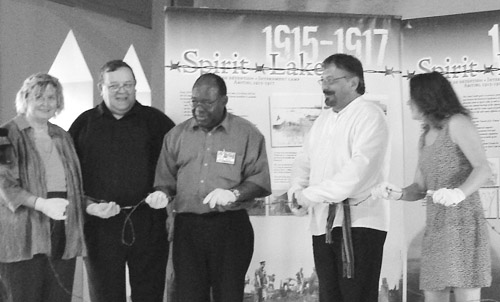
Launch of
La Ferme, Quebec - With the cutting of a barbed wire symbolizing
the Spirit Lake Internment site, on July 8, 2010, the Camp Spirit Lake
Corporation officially launched the construction of the Spirit Lake
Interpretive Centre in La Ferme, near Amos, Quebec.
Present at the press conference officially
announcing the launch of the future historic Centre at the Corporation’s
administrative headquarters were the Mayor of Amos, Ulrick Chubain, as well as
Suzanne Larochelle, representative of the Municipality of Trecesson in Northern
Quebec.
At the opening ceremony, James Slobodian,
President of Camp Spirit Lake Corporation stated “The mission is to ensure the
protection, conservation and interpretation of the historical site and the
promotion of the municipality’s cultural heritage”. The
Other speakers included Laurier Parent, the
project architect, and Rene Levesque, the Corporation’s board member and MC for
the afternoon’s ceremony.
The Interpretive Centre has been 12 years in the
making. Within the last 3 years, the project has made remarkable headway,
spearheaded by James Slobodian of
Since 1999, archeological excavations have been
taking place on the former site of the prison camp, which was built during
World War I, at the beginning of the colonisation of the Abitibi region in
Attending the launch was Andrij Hladyshevsky from
Speaking on behalf of the Ukrainian Canadian
Congress Quebec Provincial Council and Montreal Branch was its president,
Zorianna Hrycenko-Luhova who has worked on the internment issue from the early
1970s. She emphasized the importance of educating future generations regarding
the unjust internment and incorporating teaching about the internment story in
During the launch, a donation of newspapers from
Covering this major internment project were the
French-language television station Radio-Canada which provides coverage throughout
the province; television station TVA;
To help with the additional funds still needed to
complete the project, the Hon. Denis Lebel, Minister of State for Canada
Economic Development announced a grant for $152,120 through the Community
Diversification program towards the internment
In a press release inserted into each
participant’s information kit, Mr. Lebel stated “The Spirit Lake internment
camp is part of our history and a key element in the development of this corner
of Abitibi. This is why it is essential
that its memory be preserved. The camp at
During the reception that followed, sponsored by
various local businesses in Amos, a daughter of parents who lived next to the
internment site in 1915, recalled her parents’ description about how internees
would enter the local church for Sunday Services, encircled by guards with
bayonets to ensure everyone returned back to the internment site after prayers.
She will be interviewed by the Camp Spirit Lake Corporation to document
valuable eye-witness information still available about the daily life of the
internee-prisoners.
This year also marks the 95th
anniversary of the establishment of the camp in 1915. An overview of
(Left to Right): UCC
Quebec President Zorianna Hrycenko-Luhova; CSLC President James Slobodian;
Mayor of Amos Ulrick Chubain; Shevchenko Foundation President Andrij Hladyshevsky;
Municipality of Trecesson representative Suzanne Larochelle